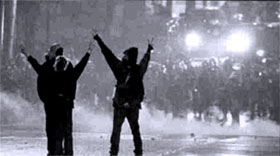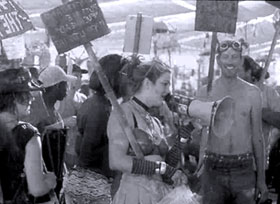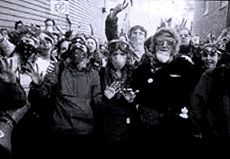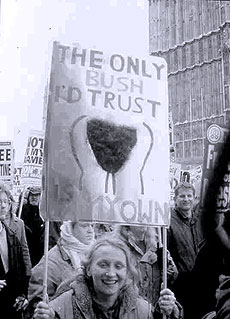|
Took place from 8.00pm to
10.00pm.
After Party 10.00pm -
2.00am DJs,
video screenings, bar.
Think Curators Think is an on-going
project, conceived by Sam Fisher,
and initiated at Goldsmiths College in 2004 by Peter Lewis
with a group of Fine Art undergraduate students.
The project invites artists to volunteer to work collaboratively
with individual students and risk a certain loss of control.
|
|
Press Release
THINK CURATORS THINK:
with Ben Fitton and Connor Linskey
The second in the projected series of events and exhibitions
to be held at Redux in the forthcoming year presents work
by the artist Ben Fitton in collaboration with Goldsmiths
student Connor Linskey, and
is organized by Peter Lewis and Makiko Nagaya.
The idea of a collaboration began with a discussion around
the language [1]
of protest placards that Fitton had previously exhibited as
messages on an LCD screen.
Fitton simultaneously sent the message by e-mail
to Connor Linskey studying at Goldsmiths College.
As an artist, Fitton was interested
in sliding one purpose and context into another's,
imagining the meaning of the message re-activated,
or exploded, by so doing.
The protest fails abjectedly as it performs a prescribed 'political'
role. [2]
Linskey would respond to the uncertainty of its performance.

Seeing a family on the tube coming home from a demonstration
with two or three of these placards propped upside down on
the train floor, handles in
the air, was a sign of their
being both ideologically used-up
and dormant, always ready for
an imaginary yet tactical use.
Placards have been mass-produced
to be handed out to demonstrators,
in a way that signaled them as ideal vehicles for both dissidence,
and its disappearance, so that
they do not really look 'used'.
The placards appear strategically as 'clean'
as their mass-production fully
declares.

Were the family saving them for another demonstration (in
which case they may have already sensed the secret futility
of the one they had just been on),
or were the placards now just souvenirs,
that would just kick around the house for a while,
or maybe get stuffed in a cupboard for a couple of years,
then eventually be re-animated
as a length of wood, as a weapon
or chair-leg,
whatever.
|
To imagine endlessly futile scenarios of use or to think through
the possibilities demands ultimately that we recognize 'politics'
as the best souvenir of all protest marches;
the thing not to achieve, prevent,
or overthrow, but to consider
the object of protest itself,
as nothing of importance to be looked at or read,
but something visually absorbed into a state of convalescence.
Everyone is ready to protest,
yet all are tired of the revolution and of any suggestion
of violent revolutionary consequences.
"Not in my name!"
starts to read more like "let's
keep things quiet, please,
like civilised folk!"

Whilst Linskey thinks through the time and value of the universal
use of placards, or specifying
particular examples of their anti-aesthetic,
Fitton is re-presenting the
LCD screen to spell out the text he originally proposed both
to Floating Ip [3]
and to Linskey.

Both Fitton
and Linskey agree to take on thinking positions about how
we could imagine things to look if they are not solely designed
to making things clear, purposeful
and hard, like the protest
placard, which fails tactically
to do its job, yet succeeds
as the re-animated object,
as Jean Baudrillard writes,
of our fascination in objects in general;
that they are illusions of themselves,
and have always disappeared, like a project
for a revolution that will always be about to occur.
|
|
1. Lacan was right.
Language does not convey meaning,
but stands in its place.
2. "Politicians
- power itself -
are abject because they merely embody the profound contempt
people have for their own lives.
Their abjection reflects the abjection of the governed,
who thereby find some way of ridding themselves of their own
sense of abjection. One should
be grateful to the politicians for accepting the abjectness
of power, and ridding others
of its burden. This inevitably
kills them but they get their revenge by passing on to others
the corpse of power. This ancient
hereditary function has never been repudiated."
Page 15, Cool Memories,
Jean Baudrillard, Verso,
1990.
3. The work was exhibited in
"Do Something"
at Floating Ip during June -
August 2004, organised by Dave
Beech, commissioning artists'
proposals for an exhibition,
that comprised the form and content of the exhibition itself.
[ Photos
] [ Events
]
|













